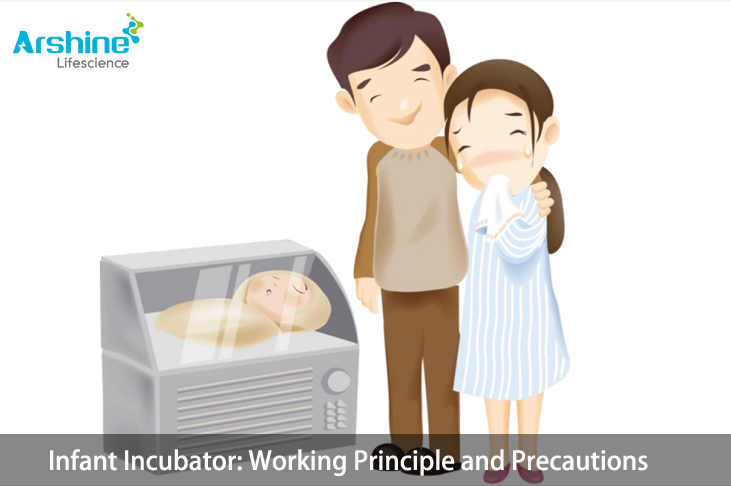An infant incubator is a crucial medical device used in neonatal intensive care units (NICUs) to provide a controlled environment for premature or ill newborns. These tiny patients are particularly vulnerable due to their underdeveloped organs and inability to regulate their body temperature effectively. Infant incubators play a vital role in creating a safe, warm, and stable environment that mimics the conditions of the mother's womb, ensuring the optimal growth and development of these fragile infants. This article will delve into the working principle of infant incubators and highlight important precautions that need to be taken to ensure the well-being of both the infants and the medical staff involved.
Working Principle of Infant Incubators:
Infant incubators operate on the principles of heat regulation, humidity control, and oxygen concentration maintenance, all of which are essential for the newborns' growth and recovery.
-
Temperature Regulation:Premature infants have limited body fat and thin skin, making them highly susceptible to temperature fluctuations. An infant incubator maintains a stable, controlled temperature, usually between 32 to 37 degrees Celsius (89.6 to 98.6 degrees Fahrenheit), which is crucial for the infant's survival. The incubator's temperature is set according to the newborn's gestational age and medical condition. Temperature sensors and feedback mechanisms continuously monitor and adjust the incubator's internal environment, ensuring that the baby remains within the desired temperature range.
-
Humidity Control:The level of humidity within the incubator is crucial to prevent the infant's delicate skin from drying out. Premature infants are more susceptible to dehydration due to their underdeveloped sweat glands. The incubator maintains a humidity level of around 50-60% to keep the skin hydrated and minimize fluid loss. Humidity sensors and control systems maintain this optimal level of moisture inside the incubator.
-
Oxygen Concentration:Infants with certain medical conditions may require supplemental oxygen to maintain proper oxygen saturation levels in their blood. Infant incubators are equipped with systems to monitor and regulate oxygen concentration. Oxygen sensors constantly assess the infant's blood oxygen levels, and the incubator's oxygen delivery system adjusts the oxygen concentration accordingly.
-
Isolation and Protection:Incubators provide a physical barrier that protects the infant from external factors such as drafts, noise, and infections. This isolation is particularly important for premature infants, whose immune systems are still developing. The enclosed environment also helps reduce the risk of cross-contamination and exposure to germs.
Precautions When Using Infant Incubators:
-
Infection Control:Strict infection control measures are essential when working with infant incubators. Healthcare providers must thoroughly clean and disinfect their hands before handling the infant or entering the incubator's environment. The incubator surfaces and accessories should also be regularly cleaned and disinfected to minimize the risk of infection.
-
Hand Hygiene:Hand hygiene is critical to prevent the spread of infections to vulnerable infants. Healthcare personnel and caregivers should follow proper handwashing techniques before and after interacting with the infants or the incubator.
-
Monitoring and Alarms:Continuous monitoring of the incubator's parameters, such as temperature, humidity, and oxygen levels, is crucial. The incubator is equipped with alarms that alert medical staff if any parameter goes out of the safe range. Regular checks of these alarms and sensors are essential to ensure the infant's safety.
-
Positioning and Handling:Proper positioning of the infant inside the incubator is vital to ensure comfort and prevent pressure ulcers. Medical staff should be trained in handling and positioning techniques to avoid unintentional injuries to the fragile newborns.
-
Caring for Skin and Eyes:Premature infants have delicate skin and developing eyes. Special care should be taken to prevent skin breakdown and eye damage. Regular assessment of skin condition and eye health, along with gentle cleaning and moisturizing, is important.
-
Parental Involvement:Involving parents in the care of their infant can have positive effects on both the infant's development and the parents' emotional well-being. Incubators should be designed to allow parents to interact with their infants comfortably while adhering to infection control measures.
-
Noise and Light Control:Infants in NICUs are extremely sensitive to noise and light. Incubators should be placed in a quiet area to minimize noise exposure, and the lighting should be adjustable to mimic a natural day-night cycle.
-
Regular Maintenance:Regular maintenance and calibration of the incubator's sensors, alarms, and control systems are essential to ensure accurate and reliable performance. This helps prevent any potential malfunctions that could compromise the infant's safety.
-
Proper Documentation:Accurate and thorough documentation of the infant's condition, parameters, and any interventions performed inside the incubator is essential for continuity of care and communication among the medical team.
-
Training and Education:Healthcare providers should undergo comprehensive training on infant incubator operation, infection control, and newborn care protocols. Continuing education and updates on best practices are important to ensure the highest standard of care.
In conclusion, infant incubators are vital tools in modern neonatal care, providing a controlled environment that supports the growth and development of premature or ill newborns. Understanding the working principles of these incubators and adhering to strict precautions are fundamental to ensuring the well-being of these vulnerable infants and promoting positive outcomes in their health and development.
